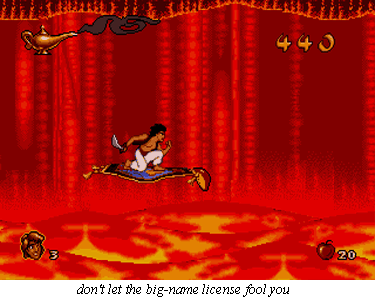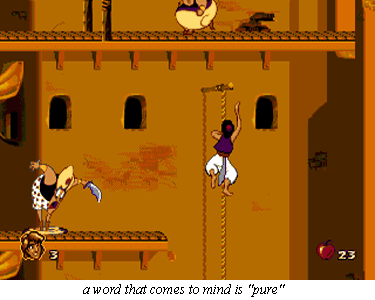I remember back when Aladdin came out for the 16-bit consoles. The magazines seemed to think it was nice enough, but there was no way a cynical teenager with a very tight budget like me was going to buy it. I recently came across the Sega Genesis and Super Nintendo Entertainment System versions of Aladdin, and I was pleasantly surprised. A word that comes to mind when trying to articulate what charmed me about this game is ”pure.”
Don’t let the big-name license fool you. Although I’m the first one to write off Disney games as crap until I have a very good reason to give them a second look, Aladdin is one of the rare gems. Right up there with the likes of Mickey Mania, Disney’s Aladdin is an example of what can happen when the right financial motivation (the license) and a company that actually cares whether the game itself sucks or not (in this case, none other than Capcom) team up. This is one of the last fruits of the very beautiful relationship between Disney and Capcom.
You most likely know the story of Aladdin and his magic lamp. If you don’t, then you’re really out of touch with folk tales AND pop culture, making me envy and worry about you. Anyway, the plot is something along these lines: A poor guy named Aladdin falls in love with a princess and then something stupid happens, causing him to end up with a magic lamp with a wisecracking genie inside who’ll grant him three wishes. But a presumably-not-very-poor but evil guy named Jafar wants to get the lamp so that he can use the three wishes to wish for evil stuff, like maybe a 3DO. And then the poor guy saves the day and makes out with the lady PG-13 style happily ever after, the end. But it doesn’t really matter, because this game isn’t about the story. And it’s pretty hacked-up from the original movie, and poorly translated as well, so you’d do fine to simply skip all the corny intermission text anyway.
The basic set of moves for our hero whispers of a primitive Earthworm Jim and an evolved Prince of Persia. (I even half-expected to see Dave Perry‘s name in the credits [though partly because of an erroneous association in my memory].) Latching onto a pole or similar object in the 2D background and swinging back and forth to propel yourself forward is a large portion of the meat of this gameplay. You can also jump on enemies or pots while holding down the jump button to bounce higher upward. To supplement, you have a sack of apples you can toss to dizzy or defeat enemies or to remove obstacles. The ambulation itself entails walking, running, sliding, jumping and long-jumping. It’s actually quite Mario-esque, only with larger sprites.
Some alternate styles are added to the mix for variation, mainly consisting of auto-scrolling levels, carpet-ride levels, and a special slot-machine-style bonus game you can access for various prizes by finding a special item in the main game.
Do you remember sprites? And multi-level scrolling backgrounds? Beautiful, hand-drawn animation? Why did we ever have to move beyond 2D?!
These feelings of nostalgia come with the territory of playing a gorgeous game like this for the first time. Aladdin is simply some of Capcom’s finest 2D work. The amount of detail brought forth in each of the characters is really spectacular, considering the resolution of the sprites; they actually look like Disney characters. And the animation is quite above par. You’ll scarcely want even one more frame.

The graphics are mostly simple, but have plenty of vibrant character to them. From the little extras that the cute monkey that follows you around presents (he’ll knowingly grin and take a bite out of apple sometimes) to the unification of the foreground graphics with the background (like the attention to detail in the flying lava rocks in the fire stages), it’s obvious that somebody invested plenty of time in making these cartoony graphics hold your interest. The game also utilizes the some nice zooming and morphing effects in a few places, without looking too out of place.
The control scheme of this game is standard fare, but the control itself is solid and responsive. The buttons are laid out very naturally, and no adjustment is required. You run, jump, toss, and float through a simple engine, and very seldom can you even give a “pfft!” to the controller. Aladdin turns on a dime, and the controls are on your side rather than the side of the difficulty level (a rarer thing these days).
The sounds are above average. They do their job well, but don’t exactly steal the show. The obligatory *jump* sound and all his friends are here, and Aladdin has a voice or two that he uses when he takes damage. Roaring fire and slashing swords all sound nice, and none of the beeps or clicks related to items or menus sound annoying. Just don’t expect anything groundbreaking.
The voices (that’s instrument voices, not human voices, for the uninitiated) used for Aladdin‘s music are just wonderful. A good example of this can be observed in the parts of the game that feature memorable music from the movie. It’s recreated faithfully, and sounds almost orchestrated.
The major downfall of this game is that it’s too easy. Any serious gamer can finish it in one sitting. (I beat it the first time without even realizing that the ‘R’ button was usable!) But Capcom has saved the day (to some extent) by adding slightly hard-to-get red jewels to the levels. The more commendable challenge in this game can be found in this. There is a given number of red jewels to be found throughout the game, and at the end of the game you can rank yourself by seeing what percentage you found, and then attempting to get more and more of these. (Also, you have to do it without using a Continue). If you get enough, you can see a different ending and get that special feeling you get when you truly master a game.
To revisit my original statement, Disney’s…sorry, Capcom‘s Aladdin is a ”pure” platform game. You master a set of a few simple moves, scroll through some (in this case only mildly) challenging scenarios, beat the final boss, grin widely, and then try to become better at it.
I can’t say I would have ever actively tried to obtain this title, but I am VERY glad I came across it. If you don’t own it, you’d be silly not to find a $5-10 copy of it on eBay. Take off your license-judging goggles and give Aladdin a fair chance. Anyone remotely inclined to enjoy platformers shouldn’t be disappointed.

